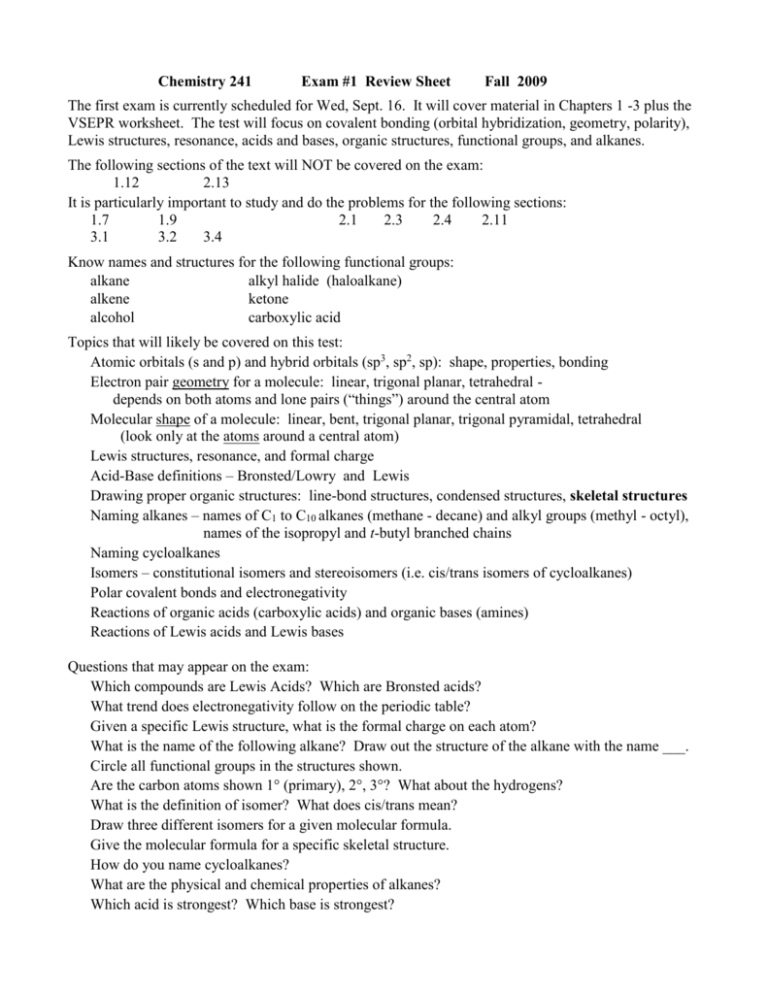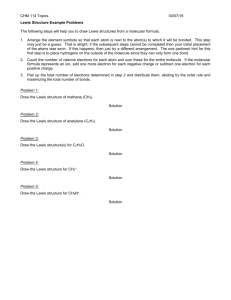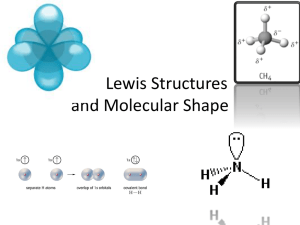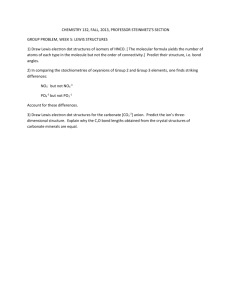Chemistry Exam 1 Review Sheet - Covalent Bonding & Organic Chemistry
advertisement

Chemistry 241 Exam #1 Review Sheet Fall 2009 The first exam is currently scheduled for Wed, Sept. 16. It will cover material in Chapters 1 -3 plus the VSEPR worksheet. The test will focus on covalent bonding (orbital hybridization, geometry, polarity), Lewis structures, resonance, acids and bases, organic structures, functional groups, and alkanes. The following sections of the text will NOT be covered on the exam: 1.12 2.13 It is particularly important to study and do the problems for the following sections: 1.7 1.9 2.1 2.3 2.4 2.11 3.1 3.2 3.4 Know names and structures for the following functional groups: alkane alkyl halide (haloalkane) alkene ketone alcohol carboxylic acid Topics that will likely be covered on this test: Atomic orbitals (s and p) and hybrid orbitals (sp3, sp2, sp): shape, properties, bonding Electron pair geometry for a molecule: linear, trigonal planar, tetrahedral depends on both atoms and lone pairs (“things”) around the central atom Molecular shape of a molecule: linear, bent, trigonal planar, trigonal pyramidal, tetrahedral (look only at the atoms around a central atom) Lewis structures, resonance, and formal charge Acid-Base definitions – Bronsted/Lowry and Lewis Drawing proper organic structures: line-bond structures, condensed structures, skeletal structures Naming alkanes – names of C1 to C10 alkanes (methane - decane) and alkyl groups (methyl - octyl), names of the isopropyl and t-butyl branched chains Naming cycloalkanes Isomers – constitutional isomers and stereoisomers (i.e. cis/trans isomers of cycloalkanes) Polar covalent bonds and electronegativity Reactions of organic acids (carboxylic acids) and organic bases (amines) Reactions of Lewis acids and Lewis bases Questions that may appear on the exam: Which compounds are Lewis Acids? Which are Bronsted acids? What trend does electronegativity follow on the periodic table? Given a specific Lewis structure, what is the formal charge on each atom? What is the name of the following alkane? Draw out the structure of the alkane with the name ___. Circle all functional groups in the structures shown. Are the carbon atoms shown 1° (primary), 2°, 3°? What about the hydrogens? What is the definition of isomer? What does cis/trans mean? Draw three different isomers for a given molecular formula. Give the molecular formula for a specific skeletal structure. How do you name cycloalkanes? What are the physical and chemical properties of alkanes? Which acid is strongest? Which base is strongest? Chem 241 Exam 1 Practice Problems 1. For these compounds, give proper Lewis structure and molecular shape. Also indicate hybridization of the central atom (shown in bold). Show all lone pairs of electrons on each Lewis structure. Electron Pair Lewis Structure Geometry Orbital Molecular Shape Hybridization HSCH2Br PH3 H2C=CHCH3 2. Draw resonance structures (at least two) for each of the following molecules. Include lone pairs and formal charges. (Do not indicate formal charges of zero.) CH3OCH2+ NO3- 3. Draw valid organic structures for three isomers of: C4H7Cl 4. Circle all atoms that are part of a functional group in these molecules. Name each functional group. OH HO O O 5. Draw an example of a Bronsted acid base reaction. Give an example of a Lewis acid/base reaction. 6. Give the proper IUPAC name for the compound shown. Cl


